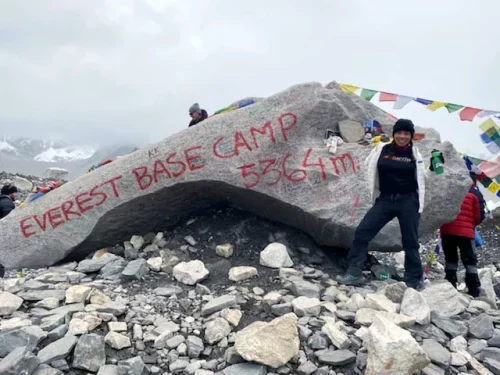How I Prepared My Mind and Body
This year, I embarked on the most physically challenging endeavor I’ve ever done: a Mount Everest expedition. As a professional athlete, I have trained hard and pushed my limits, but I’ve never put my body through something like that before.
It was an Everest base camp hike –about 17,200 feet above sea level. I hiked for 14 days, 8 hours a day. We got to do one challenge above base camp and climbed up to 18,000 feet; that was as high as I went on the climb.

There were three key aspects on which being adequately prepared –before and during the trip– made all the difference and allowed me to achieve this goal: nutrition, fitness, and mentality.
How I Prepared for a Mount Everest Expedition
Embarking on such an adventure required careful preparation, so I was diligent about being in optimal shape, adjusting my nutrition to fuel my body’s needs, and getting in the right mindset.
Nutrition: The Crucial Role of Protein
My first objective was to shed some extra pounds and get lean, so I relied on our Formula 1 meal replacement shakes to do it effectively. Our F1 shakes contain around 17 g of protein, which is crucial since protein helps you feel full longer. This enabled me to train while being on a calorie-restricted diet.
When I got to my desired weight, I had to ensure I was still strong throughout the expedition. Protein helps prevent muscle meltdown and promotes muscle growth, so focusing on consuming the right amount was important.
Before I left for the journey, I packed my bags with Herbalife24 protein and hydration products, making sure I had sufficient protein to last me for weeks. The expedition requires extreme physical effort, which would had made me lose muscle. Instead, the convenient powdered protein helped me keep my nutrition and strength in optimal levels.
Fitness: Changing the Way I Trained
My typical training consisted of doing HIIT (high-intensity interval training) and lifting heavy weights, but to be better prepared for the Mount Everest climb, I needed to do more endurance-based training.
About six months before the trip, I started to switch how I trained. It was not easy, going from being in and out of the gym in 35 minutes to doing slow and steady work on the treadmill for two hours. It completely changed my body composition – from super muscular to a leaner and toned figure that could endure longer workouts.
Mentality: Conquering Fear
Mental preparation is just as necessary as physical, and the main thing for me was getting over fear. I knew I would make it when it came to the hiking, but the thought of flying in and out of the Lukla Airport in Nepal – the most dangerous airport in the world – was daunting. And, of course, I also feared how hard the climbing would be and what climate conditions we would be dealing with.
But I told myself to trust the process and the experts: it was a good time of year to go, I was part of a group, and we were with very experienced guides. I believe that being in a group is what gets you through. You make great friendships with your teammates and motivate each other. Some days I struggled, and somebody would walk at the back with me. And on other days, I was leading the pack and pulling everybody else forward.
What I Learned From the Experience
This was a life-changing trip. I tend to worry about everything. But throughout the climb, I realized how much energy I wasted worrying and how it slowed me down. It helped me put things into perspective: there will always be something you can’t control, but you can choose to focus on what you can –like your attitude and your preparation– and how these play a big part in achieving a goal.
I also realized that, for me, the most fantastic part of the expedition was the struggle to finish. The three days it took to hike back down were much harder because I no longer had that big goal to look forward to.
That was also a major learning: the journey matters more than the destination. Life is actually the things you do to accomplish a goal.
So, if someone is planning to take on a big challenge, this is my advice:
- Don’t let anxiety or fear of failure stop you.
- Do your research: prepare yourself the best you can with available tools and information.
- Don’t put off your goals because you’re worried or unsure; just go ahead.
- Set the goal, start working towards it, make it happen, and put the fear behind you.
written by Samantha Clayton
OLY, ISSA-CPT – Vice President, Sports Performance and Fitness Education
